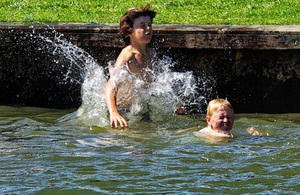Leptospirosis associated with a triathlon event
Open water swimmers reminded to take precautions to reduce the risk of illness.

River
Public Health England (PHE) is aware of 2 confirmed and 1 possible case of leptospirosis associated with a weekend of triathlon events which took place at the Avon Tyrrell Outdoor Activity Centre, in the New Forest, Hampshire between 30 May and 2 June 2014. There were also 2 possible cases in non-UK residents, one of which has been confirmed.
The 167 participants who took part in the triathlon event were from around the UK, Europe, India and the USA. All the swimming events used the same lake and all participants have been informed of the recent illnesses by an email from the event organiser, Enduroman.
The time between exposure to the bacteria which causes leptospirosis and when symptoms first become apparent is 7 to 21 days. As this time has now passed since the triathlon event, it is unlikely any new cases will be identified but it is possible retrospective cases may be picked up.
Dr Hilary Kirkbride, consultant epidemiologist at PHE, said:
Although we are not expecting to see any new cases associated with these events, we advise people who took part in the swimming events and have been feeling unwell or develop symptoms to visit their GP and take the email notification from the event organisers with them. We are working closely with the event organisers who have been cooperating fully with our investigation.
Early signs of leptospirosis include flu-like symptoms, vomiting, high temperature, headaches and muscle pains. The infection can be treated with antibiotics and most people will make a full recovery. In some cases leptospirosis can be a serious illness and patients may require admission to hospital for treatment.
Edgar Ette, event organiser for the triathlon event at Enduroman, said:
This is a very unfortunate incident and we have made sure all participants were informed of the recent illnesses by email. We are working closely with PHE and will continue to provide updates.
Open water swimming is growing in popularity in the UK but there have been outbreaks of gastrointestinal infections (diarrhoea and/or vomiting) associated with mass participation events, as well as cases of respiratory, skin, ear and eye infections. Most symptoms of these illnesses will generally be mild, caused by organisms such as norovirus, giardia and cryptosporidium.
However, there is also a risk of more severe infections caused by organisms such as E. coli O157 which may cause severe gastrointestinal illness as well as leptospirosis, which can cause liver and kidney problems.
Dr Kirkbride, continued:
In the UK, cases of leptospirosis are uncommon. There is no reason why people should not participate in freshwater activities such as swimming, sailing, water skiing or windsurfing, but we advise people to take simple precautions to reduce their risk of infection before engaging in these leisure pursuits. Practical measures swimmers can take include minimising the swallowing of water, showering soon after swimming and washing hands before eating.
Ends
Notes to editors
- More information on Leptospirosis from PHE and NHS Choices.
- PHE has published a Swim Healthy leaflet about how to reduce the risk of illness when open water swimming, following an outbreak of gastrointestinal illness at a mass-participation swim in the River Thames in 2012.
- Leptospirosis is an infection caught through contact with urine from infected animals (mainly rodents, cattle and pigs) in water or soil. The bacteria enter the body through abrasions or cuts in the skin and through the lining of the nose, mouth and eyes.
- People taking part in activities which expose them to natural water, including canals, ponds or rivers, or have contact with rats, can reduce the risk of illness by taking the following precautions:
- cover cuts, scratches or sores with a waterproof plaster and thoroughly clean cuts or abrasions received during activities
- wear appropriate protective clothing, gloves or protective footwear
- wash or shower promptly after water sports, especially if you fall in
- avoid capsize drill or rolling in stagnant or slow moving water
- wear thick gloves when handling rats
- wash hands after handling any animal, and before eating
- Public Health England’s mission is to protect and improve the nation’s health and to address inequalities through working with national and local government, the NHS, industry and the voluntary and community sector. PHE is an operationally autonomous executive agency of the Department of Health. www.gov.uk/phe Follow us on Twitter @PHE_uk
UKHSA press office: National Infection Service
UKHSA press office, infectious diseases
61 Colindale Avenue
London
NW9 5EQ